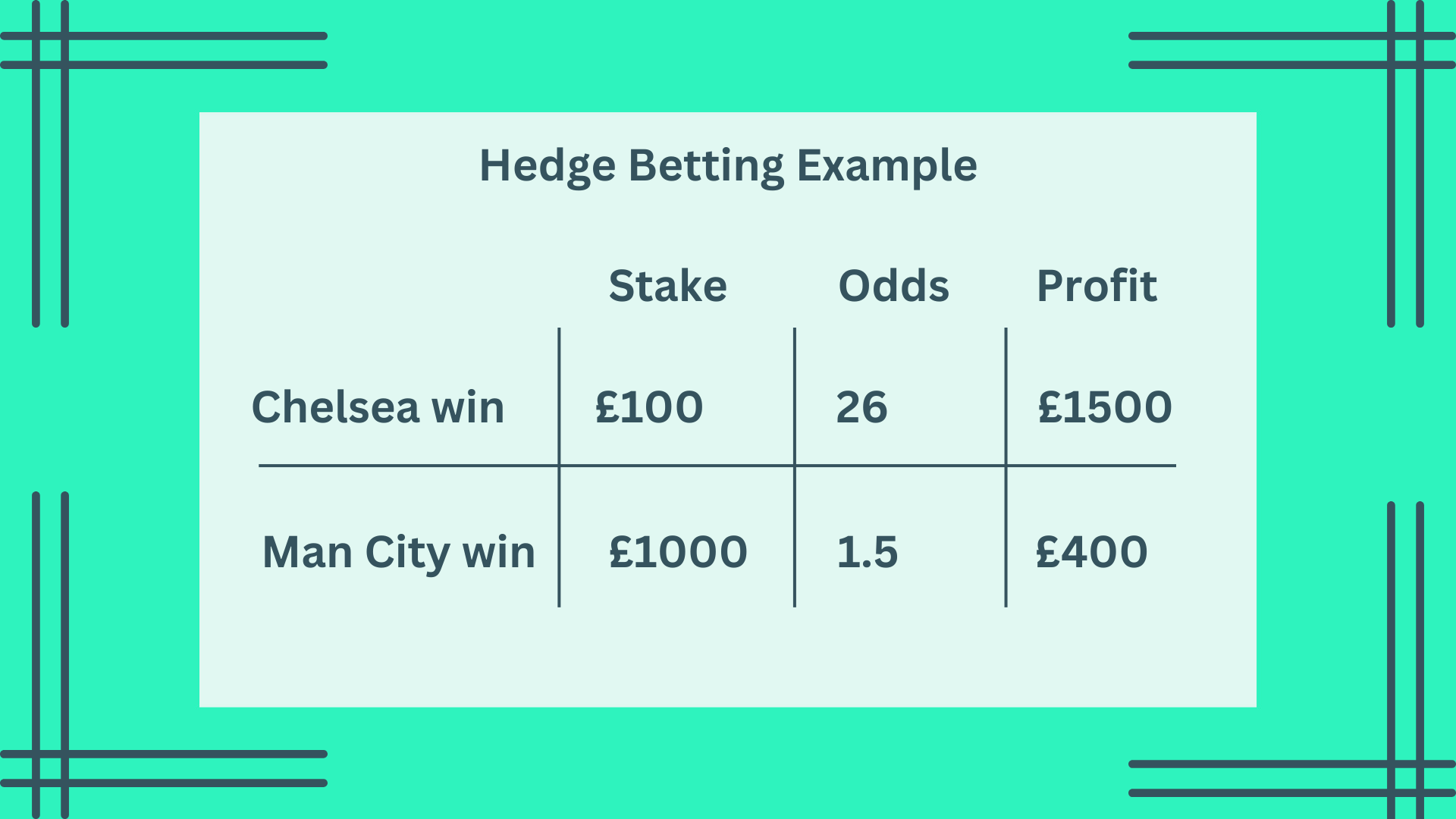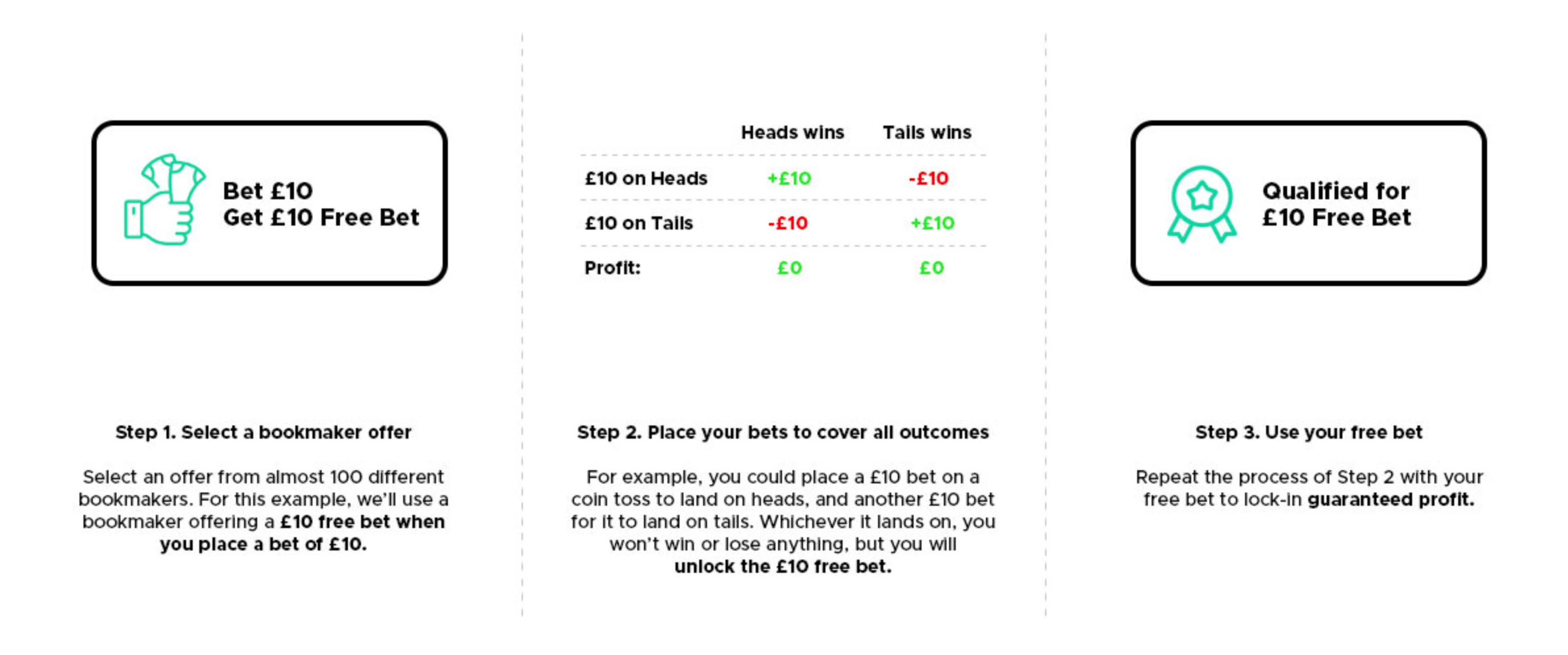What Is Hedge Betting?
Hedge betting, or hedging as it’s often known, has been around for a very long time - around 350 years! It’s even become part of the way we speak - ‘hedging your bets’ can be used in almost any situation now, with its connection to real betting half forgotten by many.
But, as with a lot of sports betting terminology, many of us will have heard of hedge betting without ever really understanding how it works.
In this article, we’ll lay out exactly what hedge betting is, how it works, and how you can take advantage of it - as well as other alternatives to ensure a profit from sports betting.
By the time you reach the end, you’ll be a hedging expert!
What Is Hedge Betting?
At its most basic, hedge betting is the practice of betting on more than one outcome on an event, either to mitigate losses or to guarantee profits.
Hedge betting usually relies on odds changing over time, which makes it possible to place a bet on two or more outcomes of an event, and to come out in profit regardless.
Depending on the odds, it can be possible to place a bet on two (or more) opposing outcomes, with the result that you ensure a profit no matter the outcome - a bit like Matched Betting.
And even if the odds don’t allow you to guarantee a profit, they might reduce your potential loss to an acceptable level, if you suspect your bet is unlikely to go on to win.
How Do You Hedge A Bet?
It does take some expert knowledge and a level of skill to put yourself in a position to successfully hedge a bet - this technique is most commonly used by professional gamblers, who understand the markets extremely well.
Furthermore, it won’t always be possible to guarantee a profit on a certain event, so you shouldn’t make the assumption that you’ll find an opportunity to hedge a bet later on.
To illustrate the principle, we’ll take football as an example - specifically, the Premier League.
The odds that Chelsea win the Premier League near the start of the season might be 25/1 (26 in decimal odds), so if you were to bet £100 early on, you’d stand to make a return of £2600 if they did indeed go on to win.
If Chelsea ended up having a great season and made it to the final, you’d be feeling pretty excited - but also distinctly anxious about their chances. What if they let you down at the last hurdle?
They might face Manchester City in the final as the underdogs, with Manchester City at odds of 1/2 (1.5 in decimal odds) to come out the winners.
To hedge your bet, you could place a bet of £1000 on Manchester City.
If Chelsea went on to win, you’d still make a profit of £1500 (£2600 minus your original stake on Chelsea and your £1000 stake on Manchester City), and if Man City won, you’d still have a profit of £400 (£1500 minus your £1000 stake and your £100 stake on Chelsea).

Hedging isn’t restricted to team sports; bettors will also sometimes place hedge bets on horse racing. For example, imagine you’d placed a pre-race bet of £20 on a relative long shot at 20/1 (decimal odds of 21).
By the middle of the race, your pick is neck and neck with the favourite to win, with the rest of the pack a good way behind. By placing an in-race hedge bet of £100 on the favourite at odds of 1/1 (decimal odds of 2), you could guarantee a profit so long as one of those two horses did indeed win - which would be looking extremely likely at that point.
If your original long shot came in as the winner, you’d have made a total of £300 in profit (£420 minus your original stake and your hedge stake), or if the favourite was victorious, you’d have £80 of profit (£200 minus your stakes).
Of course, unless you put money on all the remaining horses, you couldn’t completely guarantee a profit - and in most cases you’d be unlikely to come out in profit by hedging all the other competitors - but you would be able to put yourself in a position where you’d be extremely likely to come out in profit either way.
When Should You Hedge A Bet?
As a general rule, hedging a bet is worthwhile if it improves your position - and this is usually only going to be the case if your original bet has been placed in advance of an event, allowing time for the odds to change. You’d certainly be unwise to place large numbers of bets in advance in the hope that circumstances result in a hedging opportunity, though - it’s often just as likely that the odds will work against you, and that the most you’ll be able to do is to mitigate your losses.
That said, it’s worth keeping an eye out for hedging opportunities. Sometimes, a competitor that seems like a long shot can rapidly become a favourite for a particular event - so if you’d placed a bet when the odds on them were higher, you might well have a chance to bet on their opponents as well, and to come out with a profit either way.
Advantages And Disadvantages Of Hedge Betting
Advantages
- The possibility of guaranteeing a profit. Normally, there’s inherent risk in sports betting - and a wily hedge bet can negate that risk entirely. Depending on the stakes in question, the guaranteed profits can even be pretty high (although not, of course, as high as if a bet was left un-hedged and went on to win).
- The possibility of reducing a loss. Even when you can’t guarantee a profit, you can still lessen your potential losses if your original bet loses - and still make a profit if your original bet wins.
Disadvantages
- Hedge betting is not a guaranteed strategy. When you place your original bet, you cannot know that the odds will change in such a way as to put you in a position to guarantee a profit later on. It cannot therefore be used as your only strategy for successful sports betting.
- The reduction of your return. Hedging a bet means that your returns have to be reduced - so if your original bet goes on to win, you’ll receive less in winnings than if you hadn’t hedged your bet.
- It depends on extensive sports betting knowledge. Hedge betting is definitely not a tactic for beginners. If you’re just starting out in the world of sports betting, there are easier and more reliable ways to make dependable profits - more on this below.
Hedging In Other Fields

Hedging is also a tactic used in finance. It’s not quite so straightforward a strategy as in sports betting, but it works on the same principle: that of offsetting the risk of potential losses by placing money on an opposing position.
In finance, it works as a form of insurance (and, indeed, can literally be in the form of insurance), so that if one investment in a portfolio performs worse than expected, another opposing investment will balance that out.
Hedge funds, which many of us will have heard of without fully understanding, began with the specific intention of hedging specific investments by shorting other similar assets (i.e. investing in such a way as to profit if the market value of that asset fell). Nowadays, however, they use a variety of investment strategies (although these are still likely to include hedging).
Other Ways To Guarantee Profit From Sports Betting?
Hedge betting can be a very profitable strategy, but it’s not especially beginner-friendly, and it can be very intimidating to bettors who aren’t particularly familiar with the sports betting world.
A much more beginner-friendly way to lock in profits when sports betting is through Matched Betting. This is a technique that involves placing bets both for and against a certain outcome to earn free bets, which allow you to make a profit regardless of the result (so long as you follow the instructions correctly).
Most offers run along the lines of ‘Bet £10 and get a £10 free bet’. By matching the first bet, you break even - and you’re then able to make a profit on the free bet.

To find out more about how Matched Betting works, check out our complete guide for beginners - or if you’re keen to get stuck in, sign up for our free trial to start making your first profits today.
Summary
Hedge betting can be an incredibly useful strategy in the right situations, allowing experienced sports bettors to lock in a guaranteed profit if the odds allow. It’s not a strategy that can be relied upon in all circumstances, however, and it’s best employed by bettors with extensive knowledge and experience, as mistakes could be very costly.
For an alternative that’s risk-free, so long as you do it correctly, Matched Betting is a much safer option, especially for novice bettors. If you’re keen to get started, Outplayed’s free trial is the perfect tool to allow you to get stuck into your new side hustle right away.
Updated: 24 Dec 2024
The Author
Stephanie is a published author and, having taken up Matched Betting fairly recently, she knows exactly how beginners feel when they first start Matched Betting. She loves breaking down complex subjects in straightforward terms to make them accessible to newcomers, and to speed them on their way to making their first profits.

